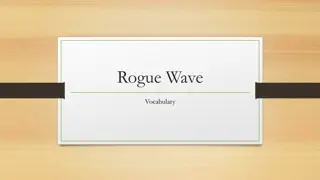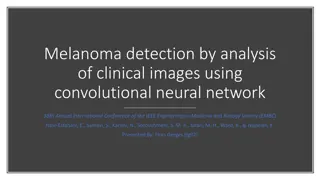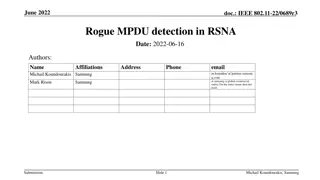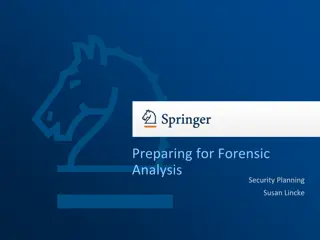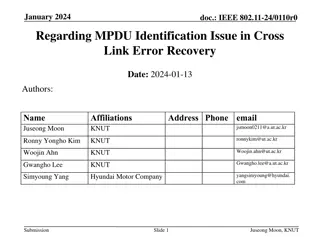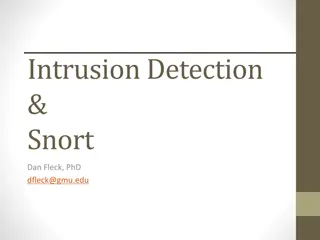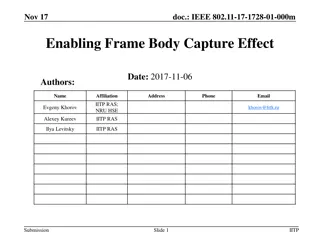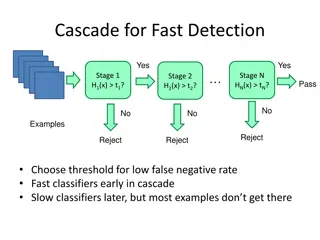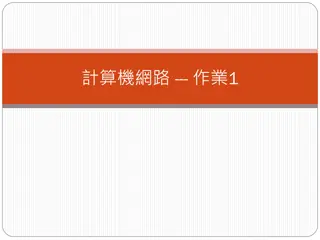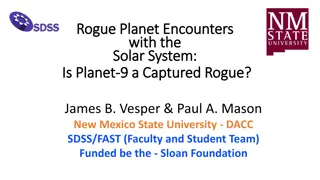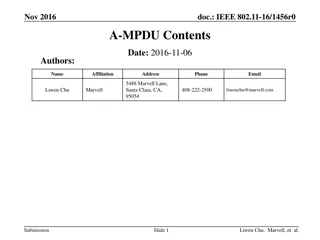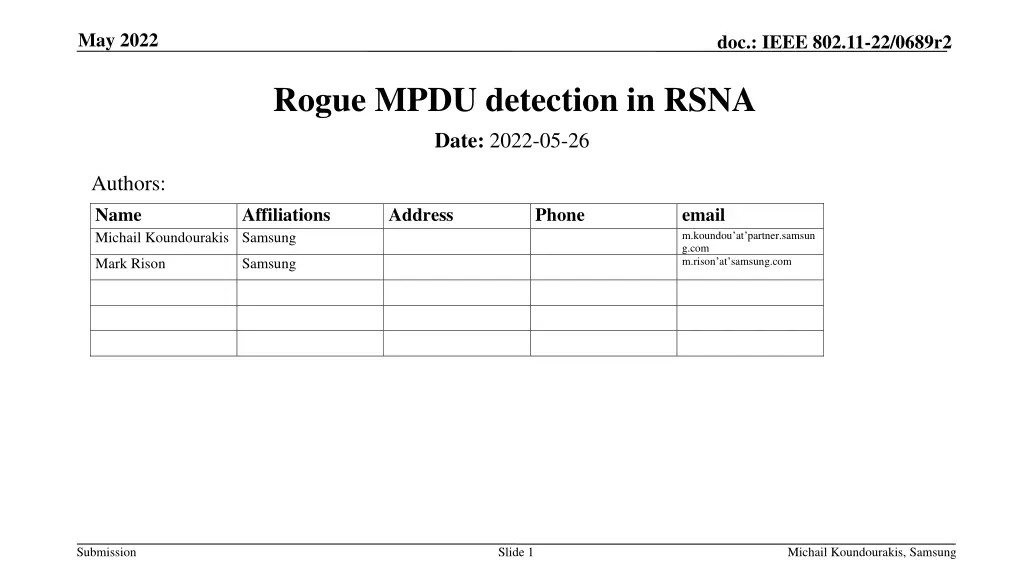
IEEE 802.11-22 Rogue MPDU Detection in RSNA May 2022 Update
Explore the update on rogue MPDU detection in RSNA within the IEEE 802.11-22 standard for May 2022. The presentation delves into frame handling rules, vulnerabilities like BlockAck attacks, and proposed improvements to enhance security without compromising functionality.
Uploaded on | 3 Views
Download Presentation

Please find below an Image/Link to download the presentation.
The content on the website is provided AS IS for your information and personal use only. It may not be sold, licensed, or shared on other websites without obtaining consent from the author. If you encounter any issues during the download, it is possible that the publisher has removed the file from their server.
You are allowed to download the files provided on this website for personal or commercial use, subject to the condition that they are used lawfully. All files are the property of their respective owners.
The content on the website is provided AS IS for your information and personal use only. It may not be sold, licensed, or shared on other websites without obtaining consent from the author.
E N D
Presentation Transcript
May 2022 doc.: IEEE 802.11-22/0689r2 Rogue MPDU detection in RSNA Date: 2022-05-26 Authors: Name Michail Koundourakis Samsung Affiliations Address Phone email m.koundou at partner.samsun g.com m.rison at samsung.com Mark Rison Samsung Submission Slide 1 Michail Koundourakis, Samsung
May 2022 doc.: IEEE 802.11-22/0689r2 Abstract The 802.11 spec has rules to describe: How WinStartR and WinStartB are updated after receiving different frames, using their SN or SSN Which SNs are acknowledged and accepted by the scoreboarding context checks, using the WinStartR to divide SN space For RSNA, the rules which define which SNs are Acked in the BlockAck frame are redundant if the STA implements Replay Detection. This presentation explains the reasons and proposes removing the unneeded clauses to simplify specification and implementation, without compromising security. Submission Slide 2 Michail Koundourakis, Samsung
May 2022 doc.: IEEE 802.11-22/0689r2 Recent discussions about vulnerabilities BlockAck Request, Control frame so unprotected, can be used in attacks to move WinStartR Protected BlockAck changes use robust ADDBA Request frame to move SSN Additional attacks identified in 22/0082 (attacker manages to mess recipient STA s WinStartR): Injection of a fake Data frame: Attacker injects a Data frame with an arbitrary SN Replay a genuine Data frame with a modified SN All attacks aim to prevent the recipient from Acking good MPDUs by taking advantage of the Rx BlockAck scoreboard handling (WinStartR): If WinStartR+2^11 <= SN < WinStartR, make no changes to the record the sequence number space is considered divided into two parts, one of which is old and one of which is new, by means of a boundary created by adding half the sequence number range to the current start of receive window Submission Slide 3 Michail Koundourakis, Samsung
May 2022 doc.: IEEE 802.11-22/0689r2 Example of an attack - WinStartR = 1000 (recipient has received and Acked SNs up to 999) - Rogue device replays SN=999 MPDU, changing its SN to 2200 (>WinSizeR) - STA receives MPDU SN=2200 and it is a valid frame, so sets WinStartR=2200 - Peer transmits MPDU with SN=1000, but STA does not Ack SN=1000 in the BlockAck response due to: - 2200+2^11 = 152 <= 1000< 2200 - 22/0082 solves this by resetting WinStartR as soon as SN=2200 is identified as a Replay. However, MPDU SN=1000 may be received before resetting has happened MLO makes this even more realistic (and complicated) Submission Slide 4 Michail Koundourakis, Samsung
May 2022 doc.: IEEE 802.11-22/0689r2 Discussion The Scoreboard context control sections, specific to which SNs shall or shall not move WinStartR, serve no real purpose: In partial-state operation all the state can end up being forgotten anyway The Receive reordering buffer control sections allow MPDU reordering buffer algorithm to have a direction of travelling so that buffered MPDUs are only released when WinStartB moves forward into the new SN space. E.g. to demonstrate old and new SN space usage: 1. WinStartB = 1000, WinEndB = 1063 (WinSizeB = 64). SN=1001 buffered, SN=1000 gap 2. Receive SN=500. Dropped due to If WinStartB+2^11 <= SN < WinStartB, discard the MPDU (do not store the MPDU in the buffer, and do not pass the MSDU or A-MSDU up to the next MAC process). SN=1001 stays in buffer as SN=500 is in old SN space 3. If this clause did not exist, then set WinStartB = 500, SN=1001 released due to moving BlockAck reordering window Submission Slide 5 Michail Koundourakis, Samsung
May 2022 doc.: IEEE 802.11-22/0689r2 Solution Duplicate Detection and Replay Check if run in cooperation (i.e. Duplicates are not identified and discarded prior to gaps in reordering buffer are closed) can be used to determine if an MPDU is legal, i.e. satisfies both not SN Duplicate and not PN Replay As a consequence: a) A replay within a reordering buffer cannot cause valid MPDUs to be discarded as Duplicate (Improvement 1) b) Attacks which move the WinStartR to cause valid MPDUs to go Unacknowledged are eliminated (Improvement 2) c) BlockAck scoreboarding rules can be simplified; any MPDU received with valid FCS within the BlockAck window size can be Acknowledged (Improvement 3) Submission Slide 6 Michail Koundourakis, Samsung
May 2022 doc.: IEEE 802.11-22/0689r2 Specification Changes For an RSNA STA which implements Replay Detection: 1. Rules which use WinStartR+2^11 to ignore valid MPDUs and not update WinStartR are removed The STA is allowed to Ack any valid MPDU received. 2. Partial state Block Ack operation becomes mandatory This is a consequence of being allowed to Ack any valid MPDU received. 3. Architecture (Figure 5-1) allows Block Ack Buffering and Reordering and Replay Detection to run in consecutive processing steps For each position of the reordering buffer: Either the SN duplicate detection is performed prior to the PN replay check (same as today), Or if multiple MPDUs, with the same SN, can be buffered then select the one with the lowest valid PN Submission Slide 7 Michail Koundourakis, Samsung
May 2022 doc.: IEEE 802.11-22/0689r2 No impact on 1. Reordering buffer rules 2. Legacy, pre-RSNA security, as BlockAck is not allowed with TKIP/WEP 3. Over-the-air signalling; capability to use method does not need to be advertised (it is all local to the STA) Submission Slide 8 Michail Koundourakis, Samsung
May 2022 doc.: IEEE 802.11-22/0689r2 Improvement 1 Claim: Current spec rules run Replay Check after Duplicate Detection. A Replay may occupy a position in the reordering buffer and cause a valid MPDU (with the same SN as the rogue MPDU) to be discarded as Duplicate: It is also responsible for identifying and discarding duplicate frames (i.e., frames that have the same sequence number as a currently buffered frame) that are part of this block ack agreement. Fix: When Duplicate Detection and Replay Check run in consecutive steps, Replay can be detected, rogue MPDU dropped and valid MPDU accepted Submission Slide 9 Michail Koundourakis, Samsung
May 2022 doc.: IEEE 802.11-22/0689r2 Improvement 2 Claim: Current spec rules allow a window of opportunity which can cause valid MPDUs to go unacknowledged (subject of 22/0082) Fix: Ack all valid MPDUs (which is simple) and let Duplicate Detection and Replay Check to cooperatively decide which MPDUs are accepted or dropped Submission Slide 10 Michail Koundourakis, Samsung
May 2022 doc.: IEEE 802.11-22/0689r2 Improvement 3 Claim: Existing reordering buffer control rules will work at the recipient despite allowing all MPDUs to be Acked Test rules: In next slides, we look at how existing reordering buffer control rules will cope with allowing BlockAck Scoreboarding to accept all MPDUs (for a TID, with valid FCS) We use rules from: 10.25.6.6.2.1 Block ack agreements not using segmentation and reassembly but these are applicable to the whole 10.25.6.6.2 Note: This only works with Protected BlockAck, i.e. only a valid ADDBA Request can move WinStartB Submission Slide 11 Michail Koundourakis, Samsung
May 2022 doc.: IEEE 802.11-22/0689r2 Case 1: WinStartB+2^11 <= SN < WinStartB Spec requires dropping the MPDU, so it is safe In theory, if STA can remember all the SN/PN for the [0, 4095] space, it may even be possible to accept a valid MPDU arriving late, i.e. after WinStartB moving beyond its SN but this goes against the spec as it stands Submission Slide 12 Michail Koundourakis, Samsung
May 2022 doc.: IEEE 802.11-22/0689r2 Case 2: WinStartB <=SN <=WinEndB Duplicate MPDUs detected, but only as replays are being identified and discarded If more than 1 MPDU with the same SN is received, with previous gaps in the reordering buffer it is now possible to know which SN is legal and which is replay of an earlier MPDU; see Improvement 1 Submission Slide 13 Michail Koundourakis, Samsung
May 2022 doc.: IEEE 802.11-22/0689r2 Case 3: WinEndB < SN < WinStartB+2^11 Performing Replay check before WinEndB is updated, allows (certain) Replays to be detected and discarded before their SN is used to update WinStartB Previously accepted PNs, and Valid PNs within the reordering buffer can be used to check for replay Submission Slide 14 Michail Koundourakis, Samsung
May 2022 doc.: IEEE 802.11-22/0689r2 Conclusion The combination of the existing Duplicate Detection and Replay Check can be used to identify all rogue MPDUs which may be received if BlockAck WinStartR rules related to WinStartR+2^11 are completely removed Scoreboard handling after removal of these WinStartR rules fixes security flaws; current method of fixing these flows uses a best-effort method which is not bulletproof Legacy devices are not affected and new signalling is not needed Submission Slide 15 Michail Koundourakis, Samsung

